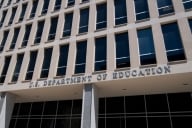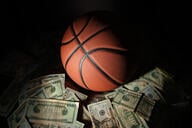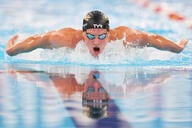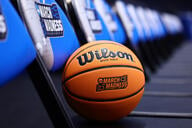You have /5 articles left.
Sign up for a free account or log in.
The Internet – or at least, the piece of the Internet where people pay moderate attention to college sports – blew up Tuesday afternoon with the news that some number of Northwestern University football players are seeking to unionize.
The apparently unprecedented step is a potential watershed moment for athletes in commercial sports programs like those at Northwestern, who were lauded by outspoken critics and sports columnists who have driven much of the public interest in whether athletes deserve more than they’re getting for all the revenue they bring institutions in the era of highly commercialized sports.
If they succeed, the athletes could gain a crucial say in hot-button issues like safety rules, revenue sharing and scholarship limitations. But if one thing is clear now, it’s that that’s a big “if.”
“Someone stepping up and doing it was really what it takes to get the ball rolling,” said Joel Maxcy, a Temple University associate professor of tourism and hospitality management who studies sports economics. “We’ll have to see how it plays out legally.”
Athletes have been considered non-employees under labor laws for more than 50 years. Tuesday’s filing centers on whether the National Labor Relations Board will, as has been the case with teaching assistants, be more inclined now to view athletes as employees entitled to collective bargaining rights.
The National Collegiate Athletic Association and Northwestern issued separate statements Tuesday saying athletes are not employees and should not have collective bargaining rights.
“We stand for all student-athletes, not just those the unions want to professionalize,” NCAA Chief Legal Officer Donald Remy said in a statement. “Many student-athletes are provided scholarships and many other benefits for their participation. There is no employment relationship between the NCAA, its affiliated institutions or student-athletes.”
But experts agree the timing of this filing is significant, and could influence the outcome. Criticism of the NCAA has escalated sharply, with potentially game-changing lawsuits regarding player safety and use of athletes’ images popping up left and right. People are increasingly aware of the economic oddity of athletes bringing in millions and getting comparatively little in return (beyond their scholarships and high-profile platforms).
At the same time, the athletes themselves have barely stood up to their institutions publicly, let alone demanded employee status. A small campaign this football season, in which a handful of football players from seven teams wore uniforms bearing “APU” (for All Players United) in protest of NCAA rules, was considered groundbreaking for this time, though it was one of a periodic set of similar protests dating back to the 1980s.
It’s not a coincidence that a call for unionization is starting at Northwestern: the football team’s quarterback, Kain Colter, was the star participant in the APU protest, which was orchestrated by the advocacy group National College Players Association – whose president, Ramogi Huma, filed the papers on behalf of Colter and his undisclosed number of teammates. (According to NLRB rules, at least 30 percent, or 26, of the team’s 85 scholarship players must sign the filing.)
A final outcome – which, if certified by NLRB, would be the College Athletes Players Association – could be more than five years down the road.
Now that CAPA and the athletes have filed for recognition, first reported by ESPN's "Outside the Lines," an NLRB regional board will consider the request. That decision could be appealed to the national board, and Northwestern and the NCAA have already made clear they oppose this movement. The decision could ultimately lie with the federal court system.
Although the NCAA will almost certainly enter the legal fray, Maxcy posited that it may be wiser to resist. That’s because if colleges and the NCAA are acting under labor laws instead of antitrust laws, when squabbles arise, everyone can work together to solve them. Acting under antitrust law as it does now, the NCAA will be at the mercy of the courts and individual athletes if they someday decide athletes should be paid.
Under labor laws, “If employees and employers agree on something, they can implement actions that otherwise would be illegal,” said Warren K. Zola, an adjunct associate professor of business law at Boston College, citing the NFL draft as an example.
Michael LeRoy, a University of Illinois professor of law and labor employment relations who proposed a sort of semi-union with financial benefits for athletes that stopped short of a negotiated salary, favors a plan that preserves the “idea of a student-athlete” rather than one that professionalizes college sports, such as unionization.
But “all the power to them,” if the Northwestern athletes can make this happen, he said.
“Low probability but not out of the question,” LeRoy said. The NLRB would have to overturn the precedent that says athletes aren’t employees while extending more recent precedent that says graduate assistants are employees, with a third party – the NCAA – also claiming it has rights, via contracts and charters, to make the rules. “I think that part makes it an uphill climb.”
Only scholarship football and men’s basketball programs from Division I Football Bowl Series institutions would be eligible to join CAPA at first. (If employee status is about money, there’s a huge difference between a football player at Florida State University and a cross-country runner from a small Division II college.) Further, the decision precedent would also apply only to private colleges. Athletes at state universities are subject to state laws, and 24 of them do not support unions.
There’s also that other concern, way, way down the line: what if the players do unionize – and then go on strike? What happens with the team Northwestern was supposed to play this weekend – to those tickets, to that revenue?
“It sounds so wonderful in theory to some people, but a serious issue is, would the conference be able to keep them in this organization?” LeRoy said. (Big Ten Conference officials also said in a statement that the conference “does not believe” that athletes are employees for their institutions.)
There’s also the possibility of college sports losing its tax exemption and what that could mean for a system that profits hugely from tax-exempt donations from fans and alumni.
“If you go through this rabbit hole, there are other unintended consequences that I’m not sure everyone has considered,” Zola said.
There will be plenty of time now, he added.
“I think this is yet another step toward some level of meaningful dialogue between the leaders of higher education, the NCAA, and those advocating on behalf of college athletes. We have unionization efforts, we have the O’Bannon case, we have the financial ramifications of the new College Football Playoff, all of which are coming together to recognize the role and the magnitude of the business of sports,” Zola said. “And I suspect that the resolution will be found in discussions and settlement talks rather than in the courtroom.”




